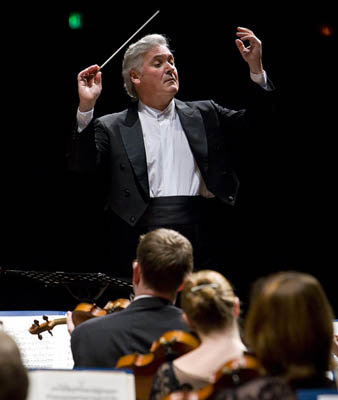The Royal Philharmonic with Pinchas Zukerman, presented by CAMA.
At the Arlington Theatre, Wednesday, January 23.

The Royal Philharmonic rolled into the Arlington on Wednesday night full of fire and minus one significant figure. The young French Canadian conductor, Jean-Philippe Tremblay, who was scheduled to conduct the magnificent Max Bruch Violin Concerto No. 1 in G Minor, Op. 26, was unable to make the concert due to illness. As a result, soloist and conductor Pinchas Zukerman took on the daunting task of conducting the profoundly complex and difficult concerto from the violin. Although the results on the Bruch were mixed, Zukerman’s feat was certainly thrilling, and overall the concert was deeply satisfying. The Royal Phil has an exquisite warm tone, and they performed with youthful passion and verve, especially on Beethoven’s Fifth Symphony, which followed the interval.
Edward Elgar’s Serenade for Strings in E Minor, Op. 20, which opened the program, laid a dreamy yet substantial foundation for what was to come. Although the substitution of Zukerman for his sometime protege Tremblay was announced from the stage at the outset, the sense that conducting the Bruch while playing the solo part would be a high-wire act did not sink in until later. But when some of the younger players began cracking musical jokes in the short tuning break between the Elgar and the Bruch, it became clear that the risk and consequent tension of performing this music without the “net” of a designated conductor was very much on their minds. Zukerman showed steely resolve as he strode to the podium, and then delivered a performance that mixed violin virtuosity with an energetic-if somewhat casual-approach to the work of conducting it. Regardless of the inevitable hesitancy that crept in at times, the piece retained every bit of its considerable appeal, and by the charming and folksy quadruple-stopping finale, virtually everyone in the hall had been won over by one of the greatest and most likeable of violin concertos.
From the first bars of Beethoven’s Fifth Symphony, which drowned out the creaking seats of the last few people to return from intermission, the Royal Philharmonic’s collective electricity was turned all the way on. During the opening allegro con brio, the orchestra’s massed army of bows moved in unison and felt strong enough to send the whole room spinning, yet the details remained crisp and delicate throughout. Search high and low; there are few auditory experiences to rival a great orchestra in full flight



